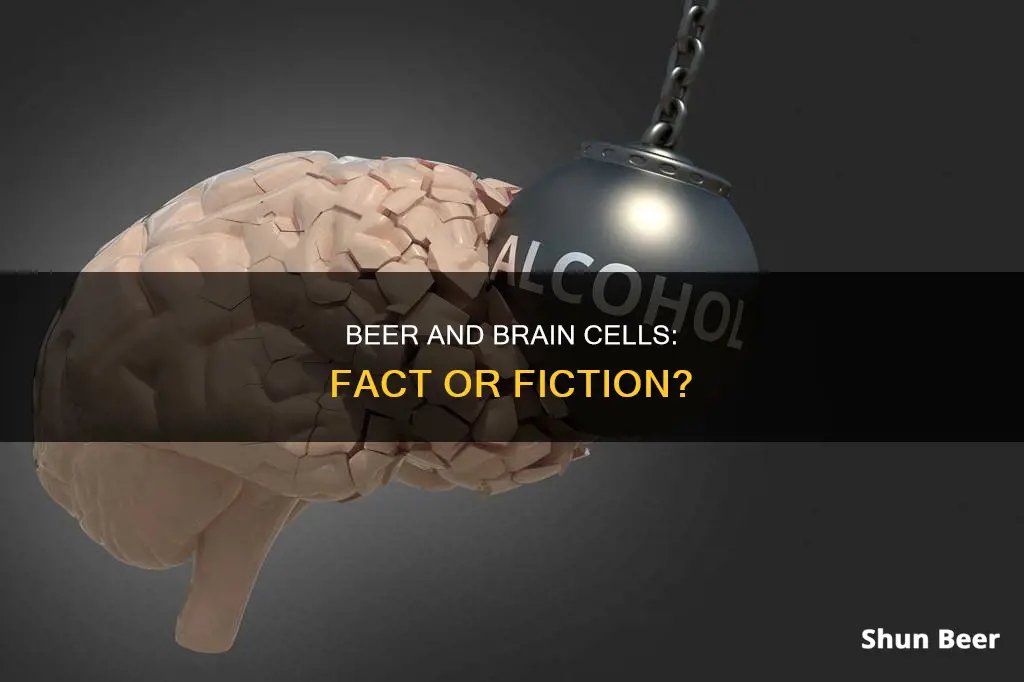
Alcohol is a neurotoxin that can affect brain cells directly and indirectly. While drinking alcohol does not kill brain cells, it does have an impact on the brain. Alcohol damages the ends of neurons, called dendrites, which makes it difficult for neurons to communicate with each other. This disruption in communication can lead to intellectual impairment, headaches, memory loss, slowed thinking, slurred speech, and trouble with balance and coordination. Additionally, alcohol can interfere with neurogenesis, the process of forming new brain cells. Research has shown that even moderate drinking can lead to shrinkage in the hippocampus, the area of the brain associated with memory and reasoning. The amount of shrinkage is directly related to the amount of alcohol consumed.
| Characteristics | Values |
|---|---|
| Does drinking one beer kill brain cells? | No, but it can negatively impact them long-term. |
| How does alcohol affect the brain? | Alcohol is a neurotoxin that can affect brain cells directly and indirectly. It can also interfere with neurogenesis, the formation of new brain cells. |
| What are the short-term effects of alcohol on the brain? | Changes in mood and behavior, difficulty concentrating, and in some cases, alcohol poisoning. |
| What are the long-term effects of alcohol on the brain? | Decreased cognitive function, memory issues, early-onset dementia, anxiety, depression, irritability, insomnia, and in some cases, Wernicke-Korsakoff syndrome. |
| Is the damage caused by alcohol reversible? | Most of the damage caused by alcohol is reversible if the person stops drinking. |
What You'll Learn

Alcohol is a neurotoxin
Alcohol triggers the release of endorphins, which are feel-good hormones that make light-to-moderate drinkers feel more relaxed, sociable, and happy. However, heavy or binge drinking can interfere with the brain's communication pathways and affect how the brain processes information.
Alcohol can cause short-term effects such as changes in mood and behavior, difficulty concentrating, and alcohol poisoning. Alcohol poisoning occurs when a lot of alcohol is consumed in a short period, causing the alcohol in the bloodstream to interfere with parts of the brain responsible for basic life support functions. If left untreated, alcohol poisoning can cause permanent brain damage and even death.
Alcohol can also have long-term effects on the brain, including decreased cognitive function and memory issues. Research has shown that brain atrophy or shrinkage is common among heavy drinkers. A 2017 study found that even moderate drinking can have similar effects, with people who drank the equivalent of four drinks a day showing almost six times the shrinkage as nondrinkers. Moderate drinkers had three times the risk of shrinkage compared to nondrinkers.
Alcohol can interfere with neurogenesis, which is the body's ability to make new brain cells. It can also lead to a thiamine deficiency, causing a neurological disorder called Wernicke-Korsakoff syndrome, which results in confusion, memory loss, and loss of muscle coordination.
While alcohol doesn't directly kill brain cells, it can negatively impact them in the long term. It inhibits the formation of new brain cells and can cause neurological disorders over time, impairing brain function and leading to other serious health consequences.
Beer After a CT Scan: What You Need to Know
You may want to see also

It can cause brain shrinkage
While drinking alcohol does not cause brain cell death, it can lead to brain shrinkage, also known as atrophy or alcohol-related brain damage (ARBD). ARBD is caused by regular binge drinking or drinking too much alcohol over several years.
A 2017 study found that even moderate drinking can cause brain shrinkage. The hippocampus, the area of the brain associated with memory and reasoning, is particularly vulnerable to the effects of alcohol. The amount of shrinkage appears to be directly related to alcohol consumption, with heavier drinkers experiencing more shrinkage than moderate drinkers, and nondrinkers experiencing the least amount of shrinkage.
The effects of alcohol on the brain can be seen through changes in mood and behaviour, difficulty concentrating, and in more severe cases, alcohol poisoning, which can lead to permanent brain damage and death if left untreated.
In addition to brain shrinkage, heavy drinking can also lead to:
- Interference with neurogenesis, or the formation of new brain cells.
- Wernicke-Korsakoff syndrome, a neurological disorder characterised by confusion, memory loss, and lack of muscle coordination. This syndrome is caused by a thiamine (vitamin B1) deficiency, which is common among those who misuse alcohol.
- Damage to blood vessels in the brain, which can lead to high blood pressure and an increased risk of stroke.
- Increased risk of head injuries, as individuals under the influence of alcohol may be more prone to falls or accidents.
Beer Overload: Diarrhea and Dehydration Risks
You may want to see also

It can lead to Wernicke-Korsakoff syndrome
While drinking alcohol does not cause brain cell death, heavy drinking can lead to a thiamine (vitamin B1) deficiency, which in turn can cause Wernicke-Korsakoff syndrome. This is a serious neurological disorder that does result in the loss of brain neurons.
Wernicke-Korsakoff syndrome is a combination of two different brain disorders: Wernicke's disease and Korsakoff's psychosis. The syndrome is characterised by memory problems, amnesia, and a lack of muscle coordination. It is important to note that the loss of neurons is caused by the thiamine deficiency, not directly by alcohol consumption.
Wernicke's disease can cause a lack of energy, hypothermia, low blood pressure, or even coma. It can also lead to a lack of muscle coordination, affecting posture and balance, and causing tremors. Vision problems, such as abnormal eye movements, double vision, and drooping eyelids, are also common symptoms.
If Wernicke's disease is left untreated, it can progress into Korsakoff's psychosis, which is not reversible. Korsakoff's psychosis can cause severe and irreversible memory impairments, including problems forming new memories (anterograde amnesia) and recalling old ones. People with this condition may also experience hallucinations, make up inaccurate stories about events (confabulation), and have difficulties with decision-making, planning, and organising.
The damage caused by Wernicke-Korsakoff syndrome occurs in a variety of brain regions, most notably the thalamus, hippocampus, hypothalamus, and cerebellum. These areas are responsible for a wide range of functions, including vision, movement, language, sleep, memory, and motivation.
While Wernicke-Korsakoff syndrome is usually associated with chronic alcohol misuse and severe alcohol use disorder, it can also be caused by other factors such as poor diet, chemotherapy, eating disorders, and certain medical conditions.
The treatment for Wernicke-Korsakoff syndrome involves immediate abstinence from alcohol and intravenous administration of vitamin B1 and glucose. In some cases, oral supplements and proper nutrition may also be recommended. Early diagnosis and treatment are crucial, as the syndrome can be disabling, produce permanent memory loss, and become life-threatening if left untreated.
Beer and Flu Medication: A Safe Mix?
You may want to see also

It can cause neurogenesis interference
Alcohol is a neurotoxin that can interfere with adult neurogenesis through multiple mechanisms. It is a pharmacologically promiscuous drug that can penetrate virtually every organ system including the brain. Alcohol can directly modulate many neurotransmitter systems and indirectly cause changes in the brain due to or comorbid with alcohol dependence. Alcohol's effects vary depending on dose and duration of exposure.
Alcohol can affect the four stages of adult neurogenesis: cell proliferation, differentiation, migration, and survival. Alcohol exposure can affect neurogenesis at any one of these individual phases or through a combination of effects at multiple stages. Alcohol intoxication leads to an overall decrease in neurogenesis through alcohol's effects on cell proliferation and cell survival. Alcohol also alters the cell cycle of neural progenitor cells.
Alcohol dependence may kill progenitor cells with long duration, chronic exposure. Alcohol intoxication reduces neural progenitor cell proliferation whereas reactive increases in neurogenesis occur at one week in abstinence. Alcohol also alters the neurogenic niche, notably producing reactive astrocytes and reactive microglia. High peak blood ethanol concentrations are likely required to impact the survival of new-born cells. Chronic alcohol exposure blunted dendritic arborization in newborn cells, an effect that would have functional implications for new cells' incorporation into hippocampal circuitry. Binge alcohol exposure kills entorhinal cortex cells that project to the hippocampal dentate gyrus.
Beer and Heartburn: Tums to the Rescue?
You may want to see also

It can lead to early-onset dementia
While drinking one beer will not kill brain cells, heavy drinking can have serious effects on the brain and nervous system. Excessive alcohol use can lead to intellectual impairment, headaches, memory loss, slowed thinking, slurred speech, and trouble with balance and coordination.
Excessive alcohol consumption can also cause damage to the nervous system, resulting in numbness and pain in the hands and feet, seizures, and even dementia. In fact, according to a study published in the Lancet Public Health journal, alcohol abuse was associated with a higher risk of all types of dementia, particularly early-onset dementia. The study found that alcohol-use disorders were diagnosed in a significant number of men and women with dementia, with the association being stronger in men.
The study also revealed that the average age of dementia onset differed between men and women, with men being more likely to develop it at a younger age. Overall, the findings suggest that alcohol abuse is a major risk factor for dementia onset and that it can contribute significantly to the burden of dementia over an individual's lifespan.
While the exact mechanism of how alcohol damages the brain is not fully understood, it is believed that ethanol and acetaldehyde, a byproduct of ethanol, have a toxic effect on the brain. This can lead to long-term structural and functional brain damage. Additionally, heavy drinking is associated with vascular risk factors, such as high blood pressure and diabetes, which can also contribute to the development of dementia.
It is important to note that the effects of alcohol on the brain can be reversible if drinking is stopped. The brain has a remarkable ability to heal itself, and even chronic alcohol abuse can be mitigated by abstinence. However, it is crucial to seek professional help when dealing with alcohol misuse or addiction, as it can have severe consequences on overall health and well-being.
Chugging 30 Beers: A Dangerous Day-Long Binge
You may want to see also







